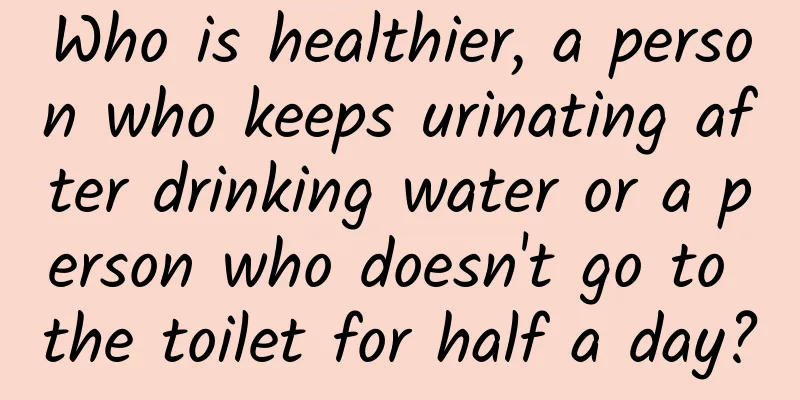Who is healthier, a person who keeps urinating after drinking water or a person who doesn't go to the toilet for half a day?

|
This article was reviewed by Zhu Hongjian, Chief Physician, Beijing Jiangong Hospital In order to maintain the normal functioning of the human body, we need to consume a large amount of water every day, which eventually forms urination after metabolism and decomposition. Copyright image, no permission to reprint But in life, some people want to go to the toilet as soon as they drink water, while others don't feel like urinating for a long time after drinking water. What's going on? And which phenomenon is healthier? 1 After drinking water How long is the appropriate interval between going to the toilet? It usually takes 30 to 45 minutes for water to turn into urine, but because everyone's physique is different and the formation of urine is affected by many factors, the frequency and time of urination after drinking water are also different. Whether you want to urinate right after drinking water or don't go to the toilet for a long time, it may be normal. Generally speaking, there are 6 factors that affect the interval between urination: Bladder capacity The bladder is an important organ that stores and produces urine. Under normal circumstances, the human bladder capacity is 300~500 ml, but some people may only have about 200 ml. Copyright image, no permission to reprint People with small bladders store less urine, and a little urine production will stimulate the bladder to generate a signal to urinate. Sphincter function The sphincter is used to control the relaxation function of the bladder. When the sphincter is relaxed, the bladder's storage capacity is poor, so it cannot store too much urine, resulting in an increase in the number of urinations; when the sphincter is tight, the bladder has a larger storage capacity, and it takes longer to metabolize water after drinking, so the number of toilet visits is reduced. Drinking habits Some people are not used to drinking water actively and have to wait until they are extremely thirsty before drinking. Over time, the bladder will adapt to the water shortage environment. Once water flows in, the bladder is suddenly stimulated and the urge to urinate is generated. Urinating habits Many people have the bad habit of holding urine for a long time due to work or study, but this will reduce the sensitivity of the bladder wall. Once the bladder sensitivity decreases, there will not be a strong feeling of urination even if the bladder is full of urine. But I want to remind everyone: holding urine is not a good habit and you should change it as soon as possible. Sweat volume When it is hot, you sweat more and more water in your body will be excreted in the form of sweat. Therefore, it is normal to drink more water but urinate less in summer. Copyright image, no permission to reprint When the temperature drops, or you always stay in an air-conditioned room, sweat evaporates less, and most of the water excretion work is handed over to the kidneys, so there is relatively more urine. Stress Being in a state of high mental tension for a long time will increase the burden and pressure on the kidneys, thereby promoting the production and excretion of urine. People who are under too much mental stress have more frequent urination and frequent nocturia. They must learn to vent their emotions, communicate more with others, and distract their attention in time. 2 Changes in urination habits Alertness is a sign of disease coming Compared with the intervals between urination, what we should really pay attention to is the sudden change in urination habits, such as a sudden increase or decrease in the frequency of urination; frequent urination at night; or problems such as urgency and pain when urinating, which may be a signal of the arrival of disease. Impaired renal function The kidneys are the main metabolic organs of water, and the formation of urine requires processes such as filtration by the glomeruli and reabsorption by the renal tubules and collecting ducts. Therefore, the most obvious symptom of impaired renal function is a change in urination habits, which may include increased nocturia, incomplete urination, foamy urine, etc. Urinary system problems If there is a urinary tract infection, overactive bladder, or irritative lesions related to the urinary system (urethritis, urethral stones, bladder stones, etc.), it may cause changes in urination frequency, increased urine output, etc. At the same time, it may also be accompanied by urination pain, abnormal urine color, low back pain, etc. It is recommended to go to the hospital for urine-related tests in time, and do B-ultrasound and other examinations of the urinary system for further evaluation to rule out the possibility of lesions. diabetes When blood sugar levels are too high, the osmotic pressure in the blood will also change. People will feel dry mouth from time to time and will constantly drink water. The urine volume will increase both during the day and at night, and they may eat more and lose weight. If your blood sugar is high and you frequently have frequent urination at night, you should consider whether you have developed diabetes. Prostate problems in men The prostate gland, which is unique to men, has the functions of controlling urination, transporting semen, and secreting prostatic fluid. When the prostate gland is infected, it will cause congestion and edema of the prostate gland, causing significant irritation at the bladder outlet, which can lead to frequent urination, urgent urination, incomplete urination, and painful urination. When the prostate function degenerates and leads to prostate hyperplasia, in addition to causing urination difficulties, frequent urination will also occur due to incomplete urination each time, which leads to a reduction in the effective bladder capacity. Female uterine fibroids When uterine fibroids are large, with a diameter exceeding 5cm, or when there are many of them, they will compress the bladder, causing the bladder capacity to shrink, thus causing frequent urination. In addition, if the fibroids compress the ureter, it can cause difficulty in urination, low back pain, and even hydronephrosis; if it compresses the rectum, it can cause constipation; if it compresses the pelvic tissues and nerves, it can cause symptoms such as lower abdominal pain or back pain. Source: I am a great doctor official account The cover of this article and the pictures with watermarks in the text are from the copyright library and are not authorized for reproduction |
>>: There is actually a Mars-like area on Earth. Where is it?
Recommend
Global iPhone 6 delivery time list: China's version is fastest
According to foreign media reports, Chuck Jones, ...
How to invest in Tik Tok information flow? Tik Tok information flow advertising click-through rate!
As the most direct profit channel for short video...
iOS A Song of Ice and Fire – Using XPC to pass the sandbox
0x00 Sequence Ice refers to user state, and fire ...
The romance of the ancient Chinese has once again been realized by China's space program!
Yesterday, the romantic Chinese once again sent a...
Why should you never wake up a sleepwalker? Can it really kill someone?
Planning and production Source: Dr. Curious (ID: ...
Marketing Promotion: How does fission marketing achieve market “fission”?
Fission marketing is like cell division, from one...
What to do if your Huawei phone consumes battery quickly after upgrading to Hongmeng? Try this method, many people say it works
Some netizens have reported that their phones con...
Maximizing IP value from the acquisition of the copyright of the popular comic "Dragon Sakura" by Alibaba
There have been rumors of Alibaba's involveme...
The sky is falling! The fleece pants you love most in winter are actually poisonous?
Recently, the content about composite fleece pant...
Free version of Wife's Secret, full version of Wife's Secret free to read!
To unlock the secrets, one must explore the past....
Watch the best TV shows on your tablet Mango TV client dual platform experience
From the old "Happy Camp" to the recentl...
Crazy hoarding makes you a big fat ball! Check out the animals that love to "hoard food"
Severe cold weather is always more difficult for ...
55-inch 4K cost-effective king Fengxing TV unboxing photos
A 55-inch 4K TV can be bought for less than 3,000...
iSO development skills—Notification and multithreading
A few days ago, I discussed with my colleagues th...









